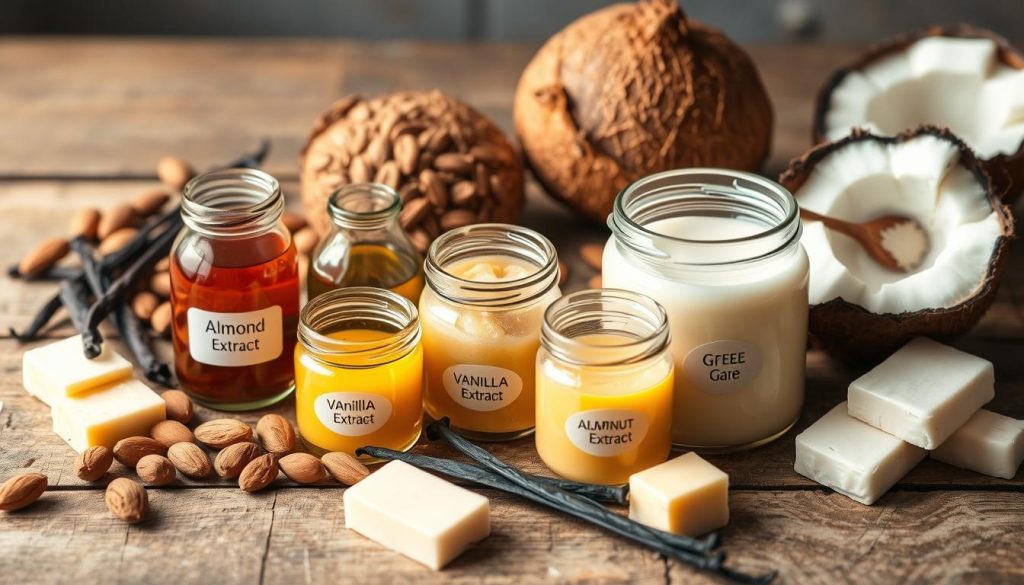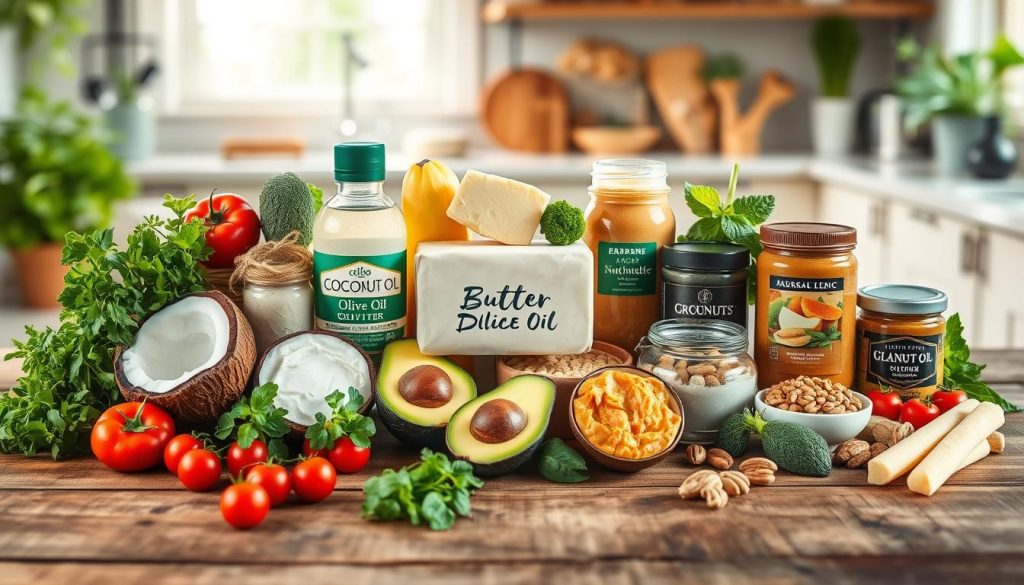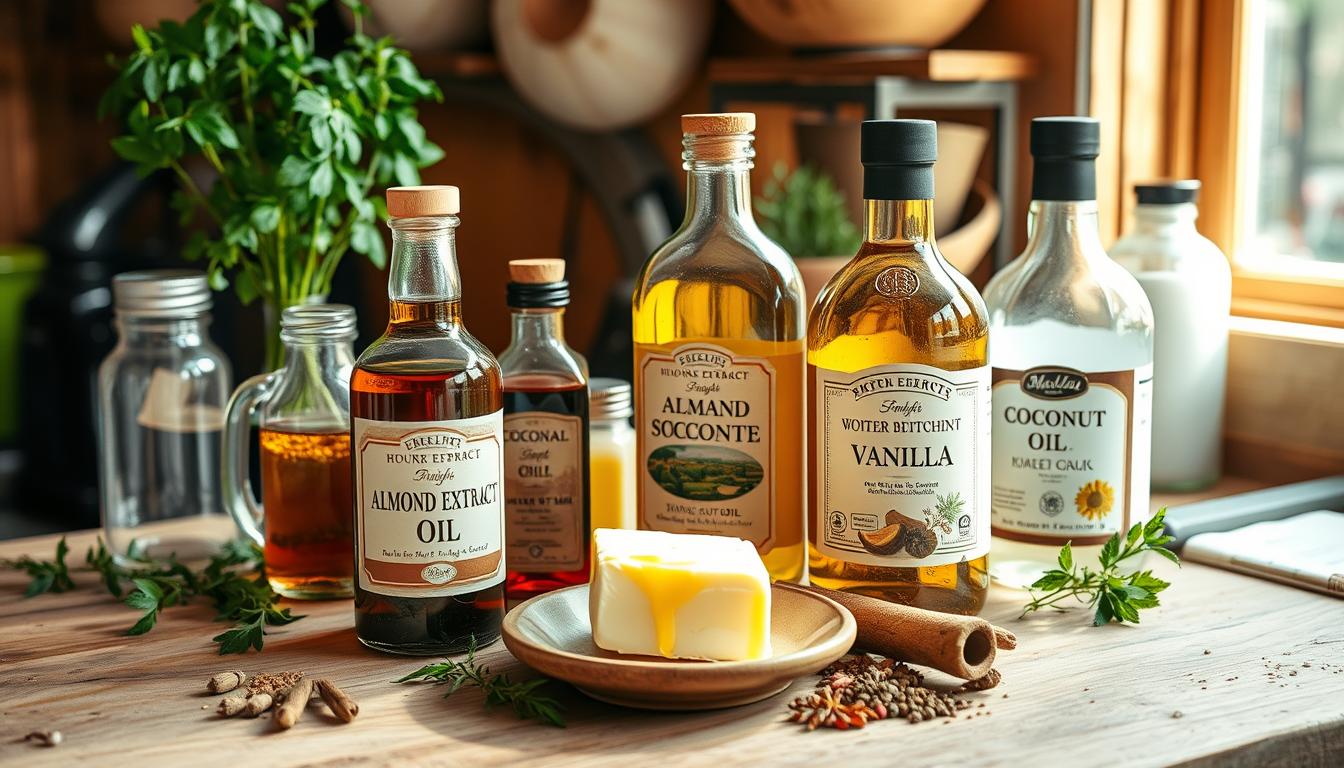Looking to add a rich, buttery flavor to your recipes? Butter extract is a great choice, but it has a lot of fat. Sometimes, you might need a butter extract substitute. This guide will show you some tasty alternatives that fit different diets.
Knowing your options for baking with butter extract substitutes is key. You’ll learn about various substitutes, their benefits, and how to use them. With the right choice, you can keep your dishes delicious and make everyone happy.
Understanding the Role of Butter Extract in Cooking
Butter extract is key in cooking because it adds flavor without extra fat. It makes dishes taste richer without the fat of regular butter. This is great for those who want to enjoy buttery tastes without the extra calories.
Using butter extract in recipes can be a big help, like in butter cookies and pastries. It adds moisture and softness, just like butter, but in a more convenient form. It’s perfect for those who need a dairy-free or low-fat option but still want that buttery taste.
Butter extract is also good for savory dishes, like French omelets or Alfredo sauce. It shows how versatile it is in cooking. Knowing about butter extract helps you find good substitutes when needed.
Understanding butter extract’s special qualities helps you improve your cooking. It lets you create dishes with consistent flavors. Plus, it makes cooking more fun and creative.
Common Uses for Butter Extract in Baking and Cooking
Butter extract is a favorite for adding flavor to many dishes. It’s used in both sweet and savory recipes, making it very versatile. When baking with butter extract, it makes cookies, cakes, and brownies taste better without adding extra fat.
It’s also great for frostings and fillings because of its rich buttery taste.
Butter extract is not just for sweets. It’s also key in cooking with butter extract. You can use it in sauces, dressings, and even savory dishes for a buttery flavor. Because it’s concentrated, only a little is needed to get the flavor right. This keeps the dish’s texture without the heaviness of regular butter.
Many chefs love using butter extract, even those who are lactose intolerant or prefer healthier options. It’s a tasty substitute that fits dietary needs.
Top Substitutes for Butter Extract
Ever found yourself without butter extract? Or maybe you just want to try something new? There are many great alternatives out there. Each one can change the taste and texture of your cooking and baking.
Margarine
Margarine is a top pick for butter extract substitutes. You can use it just like butter in baked goods. It tastes a bit different, but it keeps recipes moist. This makes it perfect for most baking tasks.
Shortening
Shortening is 100% fat, making it a great butter substitute. Use it in the same amount as butter. It makes pastries and cookies flaky and light, without any dairy.
Olive Oil
Olive oil is a standout oil substitute for butter. It adds a unique flavor and is good for you. Use ¾ cup of olive oil for every cup of butter. It makes food moist and adds a special taste.
Coconut Oil
Coconut oil is another great butter substitute. It adds a tropical flavor to your dishes. It’s full of fat and less water than butter, making baked goods rich and moist. It’s perfect for cookies and cakes.

| Substitute | Ratio for Substitution | Flavor Profile |
|---|---|---|
| Margarine | 1:1 | Similar to butter |
| Shortening | 1:1 | Neutral, flaky |
| Olive Oil | ¾ cup for 1 cup of butter | Fruitiness, savory |
| Coconut Oil | 1:1 | Sweet, tropical |
These substitutes offer flexibility and variety. They let you customize your recipes to your liking and dietary needs.
Benefits of Using Butter Extract Substitutes
Exploring butter extract substitutes can bring many benefits, like better health and more choices in cooking. These alternatives let you make tasty dishes while watching your diet and cooking style.
Health Considerations
Butter substitutes often have less saturated fat, which is good for your heart. For example, using vegetable oil instead of butter can cut down on fat. Vegan butter is also a great option for those avoiding dairy but still wanting creamy textures.
Research shows 14% of people pick butter substitutes for their health benefits. Brands like Earth Balance and Miyoko’s cashew milk butter offer these options. Full-fat Greek yogurt and avocado are also good choices for their health benefits and ability to add moisture to recipes.
Dietary Flexibility
Butter substitutes make cooking easier for those with special dietary needs. With 77% of people interested in dairy-free options, there are many choices available. Coconut oil, for instance, is great for vegan desserts because it adds moisture and flavor.
Many butter substitutes, like mayonnaise and pumpkin puree, add unique tastes to dishes. For vegans, margarine is a popular choice, as 63% of dairy-free dieters prefer it. These vegan butter alternatives make it easy to make traditional recipes without dairy.

| Substitute | Fat Content | Best Uses |
|---|---|---|
| Vegan Butter | Varies | Spreads, Baking |
| Coconut Oil | High in Saturated Fat | Vegan Desserts |
| Olive Oil | Monounsaturated Fat | Sauteing, Baking |
| Full-fat Greek Yogurt | Lower in Fat than Butter | Baking, Sauces |
| Avocado | Healthy Fats | Baking, Spreads |
Substitute for Butter Extract Guide: Overview of Alternatives
Exploring butter alternatives is key. Each option has its own taste and texture. Make sure to match the substitute with your recipe’s needs.
How to Choose the Right Substitute
When picking a butter substitute, think about a few things:
- Flavor: Each substitute has its own taste, which can change your dish’s flavor.
- Texture: Texture is important, like in baking, where it affects the dish’s feel.
- Dietary needs: Check if the substitute fits your dietary needs, like being dairy-free or vegan.
Dairy-free margarine is often a good butter replacement. If it feels too greasy, try using 3/4 cup for every 1 cup. Shortening works well too, but using 3/4 cup can make some recipes better.
Ingredient Compatibility in Recipes
Choosing the right butter substitute is all about compatibility. Here’s a quick look at some options:
| Butter Alternative | Replacement Ratio (for 1 cup of butter) | Notes |
|---|---|---|
| Dairy-free Margarine | 1 cup (or 3/4 cup if greasy) | Good for general use. |
| Shortening | 1 cup (or 3/4 cup for better results) | Non-hydrogenated brands available. |
| Vegetable Oil | 7/8 cup | Use 3/4 cup or less for preferable results. |
| Fruit Purees | 1/2 cup | Best for baking; provides moisture. |
| Coconut Butter | 1 cup | Great flavor; used in cooking and baking. |
Using substitutes like nutritional yeast or coconut butter can make your cooking better. They let you customize recipes to your taste and dietary needs.
Frequently Asked Questions About Butter Extract Substitutes
Using butter substitutes can raise many butter alternatives questions. Knowing the answers can make cooking and baking easier. Let’s look at some common questions about substitutes.
Many wonder how to replace butter extract in recipes. For keeping the flavor, use a 1:1 ratio of margarine to butter. For a richer taste, mix vegetable shortening with salt.
Adjusting ratios is another common question. Replace 1 cup of salted butter with 1 cup of margarine or shortening plus ½ teaspoon of salt. Lard is also an option, using 7/8 cup with ½ teaspoon of salt.
Flavor concerns are common when trying butter substitutes. The type of substitute greatly affects taste. Some like olive oil or coconut oil for their unique flavors and health benefits.
Here’s a quick reference for common substitutions in your recipes:
| Ingredient | Substitution |
|---|---|
| Butter (1 cup) | IDe: 1 cup margarine or shortening + ½ tsp salt or 7/8 cup lard + ½ tsp salt |
| Buttermilk (1 cup) | 1 tbsp lemon juice + enough milk to make 1 cup or 1 cup plain yogurt |
| Cake Flour (1 cup) | ¾ cup sifted all-purpose flour + 2 tbsp cornstarch |
| Cocoa Powder (1 oz) | 3 tbsp cocoa powder + 1 tbsp butter/oil |
| Egg (1 egg) | ¼ cup applesauce or ¼ cup pureed silken tofu |
| Milk (1 cup) | ½ cup evaporated milk + ½ cup water |
Understanding these FAQs on butter extract substitutes can improve your cooking. Knowing how to adjust ratios and what flavors to expect will help you make tasty dishes that meet dietary needs.
Conclusion
Choosing substitutes for butter extract can really improve your cooking. This guide covers many options for cooking and baking. You can pick from natural or artificial flavors, depending on your needs.
Using alternatives like margarine, oils, or coconut oil makes cooking more flexible. It also lets you try new things in the kitchen. Remember, a little of these substitutes goes a long way. Start with a small amount to add flavor without overpowering your dishes.
Choosing between butter extract and substitutes depends on what you like and your dietary needs. It could be because of lactose intolerance or wanting to eat fewer calories. With the right storage and measurement, you can make your dishes taste great. And you’ll get the benefits of the best substitute for you.
Source Links
- https://www.bhg.com/recipes/how-to/cooking-basics/butter-substitute/
- https://www.bobsredmill.com/blog/special-diets/what-is-a-good-substitute-for-butter/
- https://www.tastingtable.com/1600080/what-is-butter-extract-uses/
- https://food.unl.edu/article/ingredient-substitutions/
- https://thecoconutmama.com/butter-extract-recipe/
- https://www.seriouseats.com/baking-extracts-oils-powders-guide-8709841
- https://www.kitchenaid.com/pinch-of-help/countertop-appliances/butter-substitutes-for-baking.html
- https://www.thekitchn.com/butter-substitute-baking-23023173
- https://www.delish.com/cooking/a38289426/butter-substitute/
- https://www.eatingwithfoodallergies.com/is-butter-dairy-free/
- https://www.davidlebovitz.com/baking-ingredients-and-food-substitutions/
- https://godairyfree.org/dairy-substitutes/how-to-substitute-butter
- https://www.allrecipes.com/article/common-ingredient-substitutions/
- https://www.browneyedbaker.com/common-baking-substitutions/
- https://www.mccormick.com/articles/mccormick/top-10-best-flavor-extracts-for-baking
- https://www.kingarthurbaking.com/blog/2016/08/18/butter-baking
- https://www.qherb.net/news/butter-extract/
- https://blog.lorannoils.com/2019/05/10/its-all-about-that-base-extracts-vs-emulsions-for-baking/
- https://plasticcontainercity.com/blog/post/healthy-baking-substitutes-and-clever-ingredient-swaps-for-delicious-and-nutritious-treats?srsltid=AfmBOoo9G8HXx0Oid3hStiF0Syd37klkl5h34WCnSJEy4h4BIjtyQdIv
